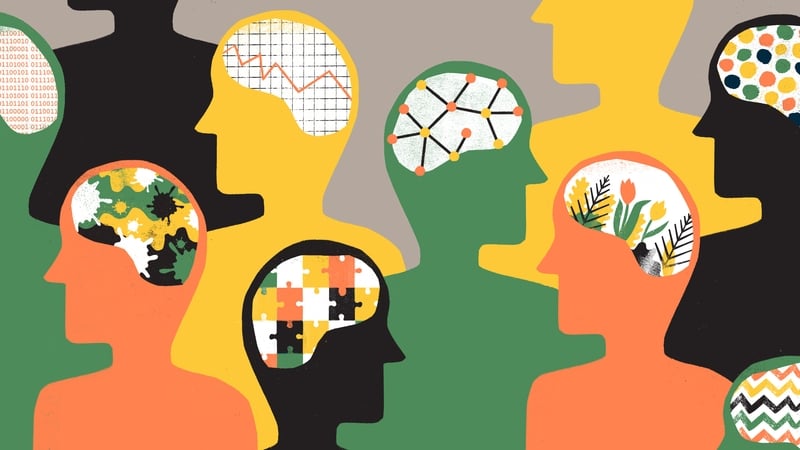Opinion: we need to view neurodiversity in the same way as we see all cultural diversities and differences
So just what is neurotypical, neurodiversity, neurodivergence and the string of other neuro words which have become part of our vocabulary? Neurotypical is a phrase that describes what society refers to as someone who has a brain that functions, behaves and processes in what is considered to be a typical or standard way. However, this term then excludes people who are autistic, have attention deficit hyperactivity disorder (ADHD), dyslexia and other neurodiverse conditions.
In a bid to promote the equality and inclusion of people who have such neurological conditions, Australian sociologist Judy Singer coined the term neurodiversity for the idea that everyone thinks differently and experiences and lives in the world in their own way. This means there is no one 'right' way of thinking or behaving and having a different brain is not a deficit. The word neurodiversity refers to the diversity of all people, such as autism spectrum disorder (ASD), ADHD or learning disabilities, as well as other neurological or developmental conditions.
We need your consent to load this rte-player contentWe use rte-player to manage extra content that can set cookies on your device and collect data about your activity. Please review their details and accept them to load the content.Manage Preferences
From RTÉ Radio 1's Ryan Tubridy Show, festival organiser Natasha Duffy on how her diagnosis of ADHD in adulthood has allowed her to better provide for neurodiverse inclusion at the SoFFt Nights music festival.
We embrace the idea of diversity within nature and other communities and neurodiverse people just want the same. That is why the neurodiversity movement was set up during the 1990s, to try to increase awareness, acceptance, and inclusion of all people, whether they are described as neurotypical or neurodiverse. It is also trying to change people’s ideas, prejudices, and mindsets around people with neurodiversity and their abilities.
Some of the other words we often hear used around neurotypical and neurodiverse include:
Neurodiversity: The diversity or variation of cognitive functioning in people. Everyone has a unique brain and therefore different skills, abilities and needs.
Neurodiverse: This describes the diversity and variation of cognitive functioning in people. Neurodiverse is typically used to describe neurodivergent people.
Neurodivergence: This denotes cognitive functioning which is not considered "typical," such as autistic, dyslexic and dyspraxic people.
Neurodivergent: This describes people who have a neurodivergence.
Neurotypical: This is a buzzword widely used in the neurodiversity movement as a label for non-neurodivergent people, that is, anyone who has a typical neurotype. This excludes autistic people, and those with ADHD, dyslexia and so on.
We need your consent to load this rte-player contentWe use rte-player to manage extra content that can set cookies on your device and collect data about your activity. Please review their details and accept them to load the content.Manage Preferences
From RTÉ 2fm's Dave Fanning Show, Adam Harris from As I Am Ireland talks about neurodiversity and autism
What is it like to have a neurodiverse difference?
Everyone is different, so everyone thinks differently and in their own way. This is not because of where they live or how they grew up, but because their brains are 'wired' to work differently too. This difference is nothing to do with intelligence as it is part of your normal human genome, your DNA. Being neurodivergent is then described as having a different way that you approach learning, or basically, your way.
What can I do as a neurodivergent?
"Comparison is the thief or death of joy" is something I have had to learn to live with and adapt too. This is because society has told us that there is a typical brain and a ‘right’ way to learn and everyone now feels this is the ‘right’ way.
When you are neurodivergent, it is more difficult to learn in the way we are encouraged to, and we often think we are less and compare ourselves to others who might be more suited to that way of learning. As a result, neurodiverse people begin to believe that they have something wrong with them or have a deficit in their brain. It can then take the joy out of doing that thing they liked or even trying out new things.
We need your consent to load this rte-player contentWe use rte-player to manage extra content that can set cookies on your device and collect data about your activity. Please review their details and accept them to load the content.Manage Preferences
From RTÉ Radio 1's Brendan O'Connor Show, Rupert Isaacson on how horse riding helps autistic children
Instead of focusing on what is supposed to work or works for others, a tip is to focus on what works for you and to do that. When you have discovered what works for you, speak to people who might be able to help and advise you further with this and research what resources and supports are available too.
Neurodiverse people can sometimes struggle to regulate their emotions, particularly in times of stress or pressure. This can be very challenging, particularly if this regulation involves bodily movements such as stimming, which is often described as repetitive motions that one may use to help them cope with emotions. Practising stimming is not a shameful activity and it can be very helpful for those times you may be seeking to regulate your emotions.
What can be done to help?
The language we hear and what we often read around neurodiversity can be very negative and degrading. As it usually describes people as vulnerable, who need to be fixed or cured and are not expected to achieve much. If you look at neurodiversity as a limitation, it becomes a barrier and can have a negative effect on all aspects of your life, but an easier pathway to success can be achieved when you alter your view of neurodiversity to a difference as opposed to a deficit.
A lot of society lack the knowledge and skillsets needed to ensure neurodivergent people realise their full potential.
Neurodiverse people live in a world that is not always designed for them, which can generate a lot of struggles that are unique to them because of how people view being neurodiverse. If we all view neurodiversity in the same way as all cultural diversities and differences, it can then be used as a means of empowerment and to promote the positive qualities possessed by those with a neurodivergent difference.
The implementation of an awareness and educational campaign around neurodiversity and inclusiveness would greatly benefit our society. This should include what neurodiverse differences are, what they are not, how these differences affect someone's experience, and what can be done to develop a more inclusive society for all. This will also challenge misconceptions, prejudices, and stereotypes about neurological differences. It will educate educators and employers on how to identify and support neurodivergent people. At present, a lot of society lack the knowledge and skillsets needed to ensure neurodivergent people realise their full potential.
The views expressed here are those of the author and do not represent or reflect the views of RTÉ



